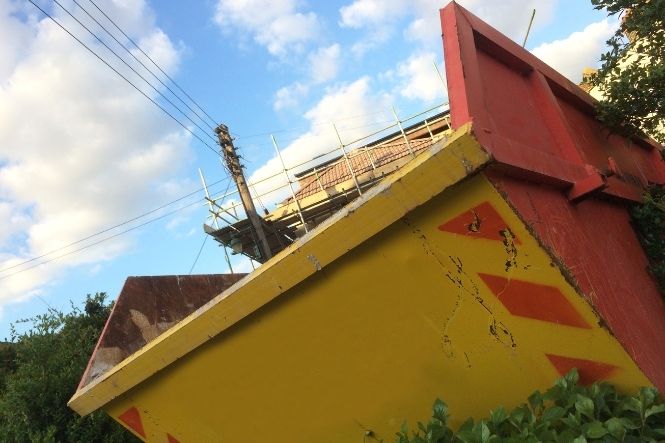When you’re making or relaying a driveway, waste disposal can be a bit of a headache, especially if you live in a very urban area. Waste is likely to come into two main categories, biodegradable waste such as soil and plant material, and non-biodegradable hardcore.
The soil and any grass, flowers, shrubs or even trees that you have to take off the top of the site is classed as green waste by most councils. Hardcore is a general term for old foundations, concrete, tarmac, stone, brick or paving block that has to be removed in order to put down new foundations and the new driveway surface.
The first thing to do is contact your local council and ask what they require you to do with the green waste. Some councils will provide a container for you to put it in or even come and collect it themselves, but this can vary from council to council.
Table of Contents
Tree Removal
The amount of waste will determine how to get rid of it as well as what it is. If you seriously have to get rid of trees to make room for your driveway, you’ll need a professional tree feller or tree surgeon to come in and do the job.
They will almost certainly deal with the waste, too. In fact, many tree fellers rely on taking the remnants away so that they can sell it on, even if it’s just for firewood. Don’t forget to check with the council before removing a tree though, you may have to apply for permission.
If your tree is in a conservation area or on green belt land, you might need to consider replacing it instead of removing it. Remember, getting rid of trees can damage the environment and cost you more money in the long run if you have to replant them later.
Skip Your Waste
The easy way out is to hire a skip. Everything can go in it but there is obviously a cost and once one skip is full you call the contractor who will come and take it away, leaving an empty one if necessary. This can be inconvenient if they can’t swap skips at the exact time you need them to.
That means having to leave piles of waste then moving it a second time when the skip arrives. Or, at worst, you have to halt the project while you wait for the new skip, if there’s nowhere to put the waste.
Recycle and Reuse Your Waste
Another option is to reuse or recycle your waste, which is cheaper but needs a lot more thought and preparation. You could advertise your plants, turf, and topsoil on local websites, with a sign on the lawn, or by putting a card in a newsagent’s window. Just say that you are making a new drive and that if anyone wants to come and take any plants, turf or soil, to come along with a spade.
Hardcore might be trickier to get rid of this way. Hardcore does have a use, it’s put in foundations as filler before having concrete poured on top of it. In fact, you could recycle some of it in your own foundations.
But if you have too much, you’ll be lucky to find someone who will want it at exactly the same time you are digging it up. This means if you do find someone who is interested and will take it away, you’ll probably have to find somewhere to leave it until they are ready.
Using the Council Tip
If you don’t have too much surplus waste, you can take it to council waste facilities for disposal. Many a council has placed restrictions on hardcore disposal to prevent commercial operators misusing domestic waste facilities. Some will restrict you to one load and others will simply assess your load as you drive up, deciding whether or not you are commercial on the spot.
A council tip should take green waste and topsoil, although some councils treat soil as hardcore rather than green waste. Check on your council website before setting off to avoid disappointment and a wasted journey. The best use of topsoil may well be to wheelbarrow it into your own garden and use it in for landscaping, if you can.
Reduce, Reuse, Recycle
The usual mantra applies to driveway waste just as much as any other, to be honest: reduce, reuse then recycle. Create as little waste as possible in the first place. Then reuse it, either on site or by giving it away, before recycling the rest through the council tip.
Not only is it better for the environment but it will work out cheaper, too. And if you can reduce the amount of waste that has to be recycled, it’s all a win-win situation.
Make sure as much as possible is reused on site by using any surplus topsoil in landscaping your new driveway and by using plants when you lay paving stones or set out flowerbeds. You may even have a plant or two that can be used to line the borders, either planted in holes you’ve dug out yourself or set into the cement you use to fill them.
Conclusion
In conclusion, if you’re planning on having a new driveway, it’s best to reduce the amount of waste as much as possible before considering whether or not to recycle your remaining waste and take it to the council tip. Check on local regulations first, however, because you may find that the most effective way for you is to hire skips.


